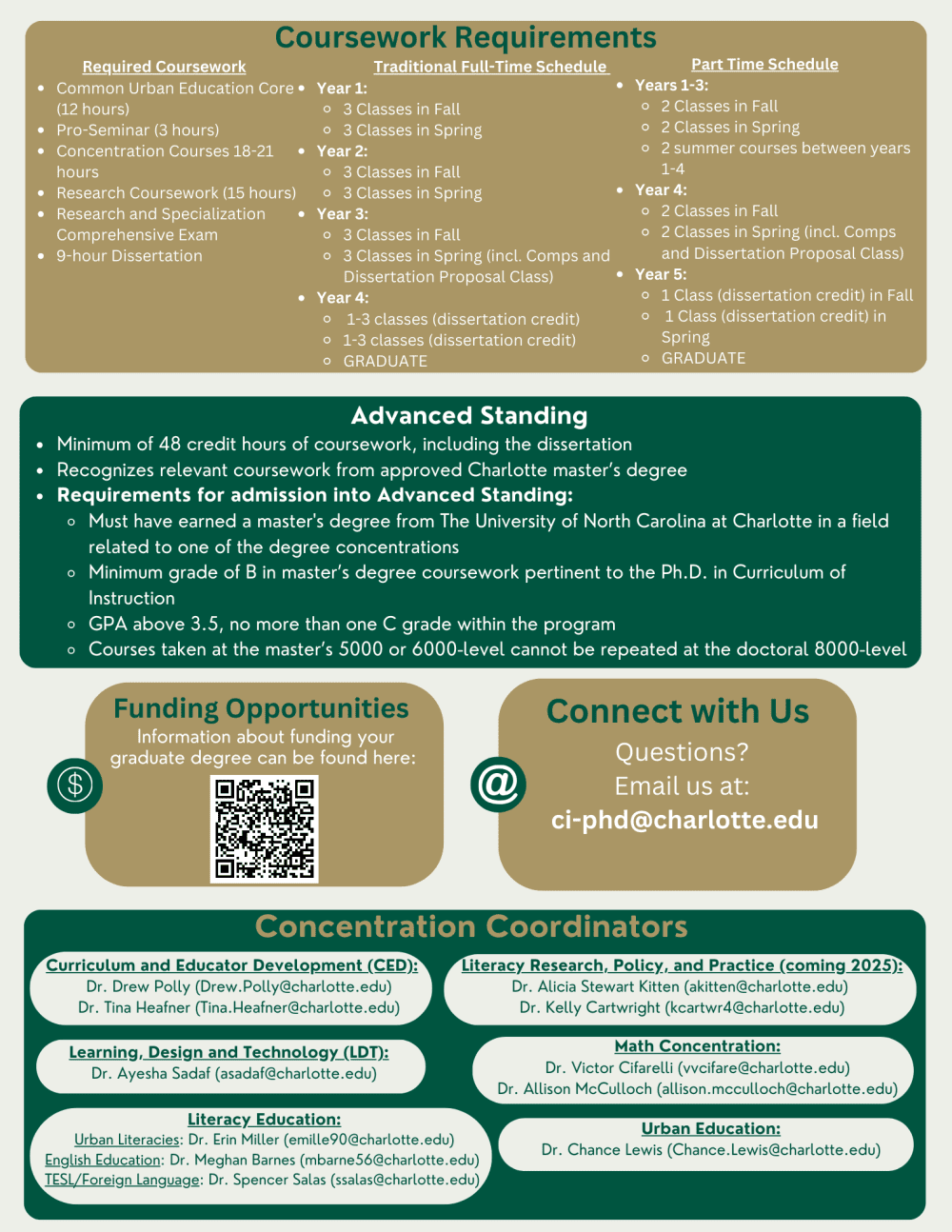Prospective Students
Program Overview
The Doctor of Philosophy in Curriculum and Instruction is an interdisciplinary degree program involving faculty from across the University of North Carolina at Charlotte campus, and primarily the Departments of English; Mathematics and Statistics; Middle, Secondary, and K-12 Education; Reading and Elementary Education; and Educational Leadership.
The Ph.D. in Curriculum and Instruction is designed to prepare teacher education faculty and other educational professionals for work in various agency, policy, non-profit, and educational settings. Studies include a substantive core in urban education and educational research. Doctoral students may focus their study on education for learners at elementary, middle grades, secondary, K-12, or post-secondary/adult levels.
The degree of Doctor of Philosophy in Curriculum and Instruction is awarded for completion of scholarly inquiry, study, and research that advances the knowledge base in the chosen field of study within the larger context of urban education. All students will demonstrate their competence in the field by writing and successfully defending a Ph.D. dissertation. In addition, recipients of the degree must demonstrate a mastery of relevant subject matter and a potential for success in future research and teaching within their concentration. The program requires a minimum of 60 hours of approved coursework.
Study is available in one of the following areas, each of which is examined through the lens of an urban educator. The five concentrations within the Doctor of Philosophy in Curriculum and Instruction emphasize the context of urban education issues and perspectives related to curriculum and instruction. The five concentrations are: Curriculum and Educator Development; Learning, Design, and Technology; Literacy Education; Mathematics Education; and Urban Education.
Beginning in Fall 2025, the Curriculum and Instruction PhD program will add a sixth concentration: Literacy Research, Policy, and Practice. The Literacy Research, Policy, & Practice concentration will focus on the development of candidates’ knowledge of research, theory, policy and practice as it relates to the implementation of effective literacy learning experiences and environments to address educational needs and issues in elementary, middle/secondary, post-secondary, or community settings with an emphasis on urban contexts.
To learn more about each concentration, check out the Areas of Concentration page.


Click the button below to download a copy of the informational flyer
Doctoral Information Session Events
Please check back at a later date for a schedule of information sessions.
Prospective Student Information Session
If you are interested in learning more about the Ph.D. in Curriculum & Instruction program, you may watch this recording of a previous virtual information session.
PowerPoint Slides for the Information Session are available for your viewing here.
Program Requirements
| Documents | Link |
|---|---|
| Ph.D. in Curriculum and Instruction Student Handbook | |
| EDCI Three Year Course Schedule | |
| Curriculum and Educator Development (CED) Concentration Plan of Study (2024-2025) | |
| Math Education Concentration Plan of Study (2024-2025) | |
| Urban Education Concentration Plan of Study (2024-2025) | |
| Literacy Education Concentration Plan of Study (2024-2025) | |
| Learning Design and Technology (LDT) Concentration Plan of Study (2024-2025) | |
| Literacy Research, Policy, and Practice Concentration Plan of Study (Coming Fall 2025) |
More information about the program of study can be found in the Graduate Catalog for the most recent year.
Admissions Information
Complete applications including all transcripts, recommendations, statement of purpose, curriculum vitae, and writing sample must be submitted to the Graduate School through their online application system.
Admissions Deadlines
The Ph.D. in Curriculum and Instruction reviews applications annually. Applications are due the first Monday in January each year. Admissions decisions are communicated to applicants by the beginning of March.
Enrollment Deadlines
Summer admission allows doctoral students to begin coursework in either summer or fall semester. This choice of start date is determined after admission in consultation with the program director. Most students accepted enroll in at least one course in summer. Although a summer start is recommended, all accepted students must begin coursework in fall semester. If accepted applicants do not enroll in summer/fall courses, they will need to reapply to the program.
How to Apply
Applicants are expected to submit a statement of purpose, curriculum vitae, a minimum of three recommendations, and a writing sample from their most recent degree. Admissions counselors are available in the Graduate School should you need assistance with the online application process. Applications submitted after the deadline will be reviewed once applications which met the deadline have been considered. Please note that a summer start is not guaranteed if the January deadline is not met.
Optional application materials: GRE or Miller Analogies Test (MAT) scores, documentation of scholarship(s) or funding for doctoral education, and additional recommendations.
Suggestions for writing a good statement of purpose can be found here.
Applications should be submitted through the Graduate School. Click here to learn more.
International Student Resources
Program-specific requirements for international students can be found on our Curriculum & Instruction International Applicants page
The Graduate School has additional application requirements for international students applying to UNC Charlotte. Please refer to the graduate school website for more information on these requirements.
Funding Your Doctoral Education
At this time, we do not have available funding to support Curriculum & Instruction PhD students. There are, however, a variety of ways students can fund their education through loans, scholarships, and assistantships.
Below are listed some resources for you to explore for funding your doctoral education.
- view the Graduate School’s funding webpage for additional ways to fund your graduate education
- view the University’s Scholarship Office web page
- view the Hirer-A-Niner section of the University Career Center for on campus jobs
- view Graduate Admissions- Afford tab
- reach out to your advisor for other funding stream suggestions
Applying for Residency
Students that are United States residents who have relocated to the state of North Carolina may be eligible to apply for residency. Students are eligible for residency determination after they have lived in North Carolina for 366 days and have completed acts of residency. Students may apply for North Carolina residency for tuition purposes via the Residency Determination Service. If granted North Carolina residency, your tuition cost will be reduced significantly.
The UNC Charlotte Holmes Scholars Program
The Holmes Scholars Program is a national university-based program that supports doctoral students who self-identify as racially and ethnically diverse and are pursuing graduate degrees in education. UNC Charlotte’s Holmes Scholars Program has recently been expanded and revitalized, with plans for at least three immediate cohorts with 4-5 doctoral students in each cohort.
Who is eligible to apply? The Holmes Scholars Program supports doctoral students (EdD and PhD) who identify as racially and ethnically diverse and intend to work in faculty positions in higher education upon graduation. Holmes Scholars must participate in the program for at least three years, therefore we are accepting applications from new doctoral students (who start in Fall 2024) or doctoral students with at least three years remaining in their programs of study.
What do Holmes Scholars receive? UNC Charlotte Holmes Scholars receive on-going mentoring, peer support, and professional development. They also receive funding to attend the AACTE annual Holmes Scholars pre-conference, a Washington Week advocacy experience, and a writing retreat. The Holmes Scholars program does not provide funding for tuition, graduate assistantships, scholarships, or travel external to the Holmes Scholars program.
How can I apply? Eligible doctoral students and doctoral applicants can apply for the program now! The application link is here and is due April 1.
How can I learn more? Please visit https://education.charlottewp.psapp.dev/resources/holmes-scholar-program/ to read more about the program or see more in this video:
Holmes Scholars Final Video (1).mp4
Who should I contact with questions? Please email either of the program coordinators– Dr. Daniel Alston (REEL) or Dr. Clare Merlin-Knoblich (CSLG)– or the Holmes Scholars Advisory Group members– Dr. Lisa Merriweather (EDLD), Dr. Brittany Anderson (MDSK), and Dr. Ya-yu Lo (SPED).
Grades Required
A student must maintain a cumulative average of 3.0 in all coursework taken. An accumulation of two C grades will result in termination of the student’s enrollment in the program. If a student makes one grade of Unsatisfactory in any course, then enrollment in the program will be immediately terminated.
Transfer Credits accepted
The program will accept six transfer hours from an accredited institution if these align with program requirements, providing the appropriate Curriculum and Instruction faculty determine that the course or courses to be transferred are appropriate for the program of study and are graduate-level courses beyond the master’s degree. (See the concentration coordinator and program director about this course-by-course review.) Courses accepted for transfer are subject to the same time limitation as courses taken in residence. Finally, the grades in these transfer courses must be an A or B. The remaining 54 hours, including all dissertation work, must be completed at UNC Charlotte.
Time Limitation
Students will be admitted each summer/fall with the understanding that most students will be part time and will usually take six hours per term. (NOTE: Students will take some courses together as a cohort, including those taken the first semester.) The program requires a minimum of 60 semester hours. Students will have a total of nine years to complete the program, including dissertation, beginning from the date of the first course, including transfer credits. With the approval of the student’s strand coordinator and the doctoral program coordinator, six hours of transfer credit for post-Master’s coursework earned at an accredited university within the previous five years will be accepted.
After acceptance into the program, students will begin work in both the urban core and the area of specialization; for example, it is recommended that a student take the foundations course and an urban core course in the first semester and one specialization course and either an urban core or research course in each of the second semester if beginning in fall. The program recommends students begin their coursework in summer with an urban core, research, or specialization course before joining the fall cohort. Guidance concerning course selections will be provided by the program and concentration coordinators upon the student’s acceptance to the program. The program director will also offer guidance on avaialble and recommend coursework.
Note, as well, that summer courses will be available based on demand and funding. Though the university will target three or more summer courses each year, variations may not always be available. (For example, the same courses might be taught every summer, with minimal rotation.) The program director and concentration coordinators will talk with students during fall semester to determine summer course needs and will work to accommodate those needs whenever possible.
Student Dispositions and Faculty Expectations
Doctoral students are expected to actively and enthusiastically engage in a variety of opportunities that will both contribute to their program and prepare them for their desired careers after graduation. For example, students should be able to:
- Read and reflect on complicated texts
- Prepare for class thoroughly in order to participate in intellectual discussions with deep analysis and synthesis
- Submit reflective and purposeful assignments with appropriate formatting by the established due date
- Develop an organized compilation of foundational readings throughout all courses using a systematic process of tracking and note taking
- Plan for and embrace the depth of knowledge and skills required to produce a research study that has the potential for making a significant contribution to the field
- Present at local, state, and/or national conferences
- Write for publication
- Show the potential for service to the field
- Exhibit professional ethics and outstanding conduct in all situations
For additional information contact:
The Office of Middle, Secondary, K-12 Education:
ci-phd@charlotte.edu
Phone: 704-687-8875 or 704-687-8878
Fax: 704-687-1630